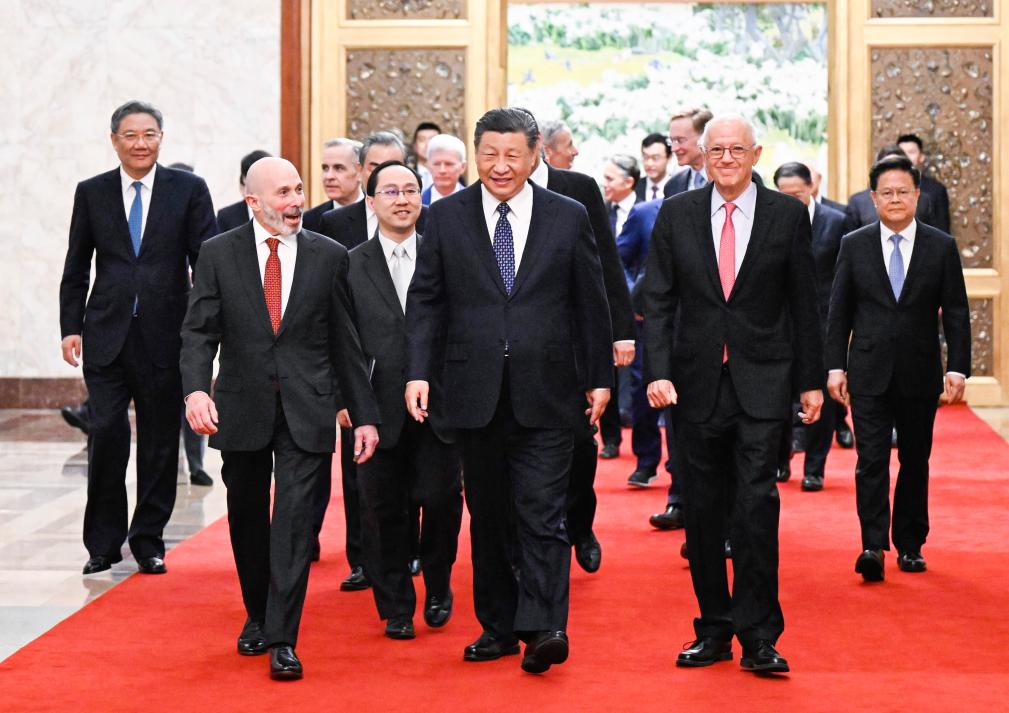Xi meets US entrepreneurs to stop investor flight
The Chinese president reassures of 'ample room for development' even for US companies, which are worried about the implications of the increasingly tightening mesh imposed by 'national security' laws and the crisis in the Chinese economy. Meanwhile, Beijing itself only plans 'national options' for the operating systems of government computers and servers.
Beijing (AsiaNews/Agencies) - Chinese President Xi Jinping met with a group of leading US business figures. A rare move, it shows how China is trying to allay the concerns of foreign businesses and restore confidence in the Chinese economy in a context of slow growth and a sharp decline in foreign investment. The Beijing meeting was attended by executives from major companies, including Blackstone's Stephen Schwarzman and Qualcomm's Christian Amon.
According to official Chinese media, President Xi Jinping has promised to "provide broader development spaces for companies in several countries, including the United States." Xi said China's reform and opening-up will not stop. In his speech he emphasized exchange and cooperation.
About twenty American representatives participated in the meeting, which lasted 90 minutes. Xi Jinping shook hands with business leaders, accompanied by Foreign Minister Wang Yi. This is the second meeting of this type after participation in the APEC summit in San Francisco last November, when Xi met with American President Joe Biden.
The meeting takes place in a worrying context for Beijing. Official data from China showed a cut of 33 billion dollars in direct investments in 2023, with a drop of 81.7% compared to 2022. Foreign investments are at a 30-year low, with an ever-increasing number of investors complaining about legal uncertainties in China, as the ruling Communist Party puts national security ahead of economic cooperation.
Foreign companies are concerned about potential risks arising from the expansion of the scope of the anti-espionage law and the restriction of cross-border data transfer. Furthermore, the structural economic slowdown and trade environment have forced companies to reevaluate the benefits and risks of the Chinese market. China confirmed an annual growth target of 5% at the Two Sessions, which analysts consider ambitious.
The meeting with Xi took place at the conclusion of the China Development Forum on March 24 and 25. In the past, he was the prime minister to meet foreign economic leaders on this occasion. And the fact that the president replaced Prime Minister Li Qiang shows that Xi has acquired absolute control over economic affairs.
Geopolitical conflicts weigh heavily behind the flight of foreign investments. Chinese police have raided some consultancies on national security grounds, while manufacturers have moved parts of their supply chains out of China.
Chinese Prime Minister Li Qiang had sought to reassure foreign businesses at the World Economic Forum in January. And China's Ministry of Commerce has pledged to hold a monthly roundtable with foreign companies to address their concerns.
But just in recent days the new controversy has exploded over Chinese hackers supported by the authorities who allegedly targeted Chinese politicians, companies and dissidents abroad. The United States and the United Kingdom have launched joint sanctions against seven Chinese citizens over alleged persistent cyber attacks.
Themes also surfaced during the visit to China of the Prime Minister of the Netherlands, Mark Rutte, underway in these same days. Rutte also raised concerns about Chinese cyberespionage penetrating Dutch military networks.
The Netherlands has also imposed restrictions on the export of photolithography devices, used for the production of microchips. For his part, Xi said that "no force can stop the advance of Chinese technology" and warned Rutte against "decoupling and severing ties" with China.
However, China itself has adopted its own version of the de-risking strategy. Chinese authorities are planning to phase out US microprocessors, particularly Intel and AMD, from government computers and servers. The authorities are also trying to abandon the Microsoft Windows operating system. Public procurement will favor national options, deemed "safe and reliable".







.png)










